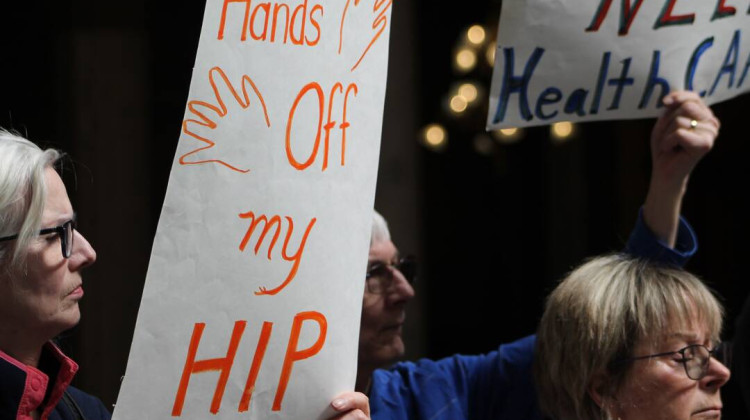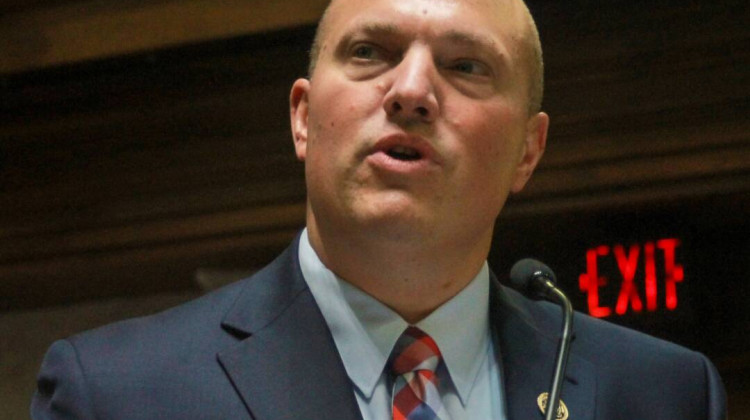
The New Castle Correctional Facility has 72 new cases so far in August.
Indiana Department of CorrectionIndiana prisons have seen an August spike in coronavirus infections, with 159 new cases reported since July 31.
Reported cases of the virus trickled in throughout July: Nine people in state prisons tested positive for the disease, bringing the total to 733 cases by the end of last month. The August surge is concentrated in two facilities. The Putnamville Correctional Facility has seen 86 cases, and the New Castle Correctional Facility has 72 new cases, bringing the new total among all state prisons to 892 cases — an increase of more than 20 percent in two weeks.
Indiana Department of Correction officials declined an interview request for this story.
“Similar as the rest of Indiana is experiencing, there has been an uptick in positive COVID-19 cases,” a spokesperson wrote in an email to Side Effects, adding that offenders and staff wear masks to slow the spread of the virus, and that, “offenders who are symptomatic are separated from those without symptoms.”
Suzie Rimstidt, whose son is incarcerated at the New Castle prison, said that conditions inside make it impossible to social distance.
“So far he’s been very fortunate, but it’s inevitable that it will explode at some point,” said Rimstidt, who also works with Indiana-CURE, an organization that advocates on behalf of prisoners. “It’s the proverbial petri dish.”
Rimstidt also thinks the agency’s case count is low.
“Unless you’re symptomatic, they don’t test.” she said. “Why is that fair when anyone else in Indiana can get a test?”
The rate of positive tests is higher than 70 percent in some Indiana prisons. Corrections officials say they test offenders in accordance with Centers for Disease Control and Prevention guidelines. But, as Side Effects has previously reported, advocates and inmates have said that even those with symptoms may not receive a test.
The spread of the coronavirus in correctional settings may affect the communities around them, according to Eric Reinhart, a researcher and medical student at Harvard University and The University of Chicago.
In a study published in June, Reinhart found that more than 15 percent of all cases in Illinois were associated with people entering and leaving the Cook County Jail in Chicago. He says that while people enter and leave prisons at a slower rate than county jails, those facilities still pose risks to the surrounding communities.
“Prisons in rural areas are very often significant sources of employment,” he says. “That constant inflow, outflow of staff is something that really puts these communities at risk.”
So far in August, 23 corrections staff have tested positive for the virus, including four at Putnamville and three at New Castle.
Jane Henegar, director of the ACLU of Indiana, said that given the conditions inside correctional facilities, the recent surge in cases didn’t surprise her.
“We’ve always known that it’s a recipe for disaster, and it’s tragic,” she said.
The ACLU of Indiana and other advocates have called for Gov. Eric Holcomb and other officials to take steps to reduce the number of people in prison by releasing certain offenders, such as the elderly, or those close to their scheduled release dates. Governors in many states have taken such steps, but Holcomb has refused, leaving sentence modification decisions to local courts. Only a handful of states have released fewer prisoners than Indiana, according to a report from the ACLU and the Prison Policy Initiative.
“The state can do things to reduce the risk, and the longer they are reluctant to take those steps the more harm that can be done,” said Henegar.
This story was produced by Side Effects Public Media, a news collaborative covering public health. Jake Harper can be reached at jharper@wfyi.org. He's on Twitter @jkhrpr.
 DONATE
DONATE






 Support WFYI. We can't do it without you.
Support WFYI. We can't do it without you.